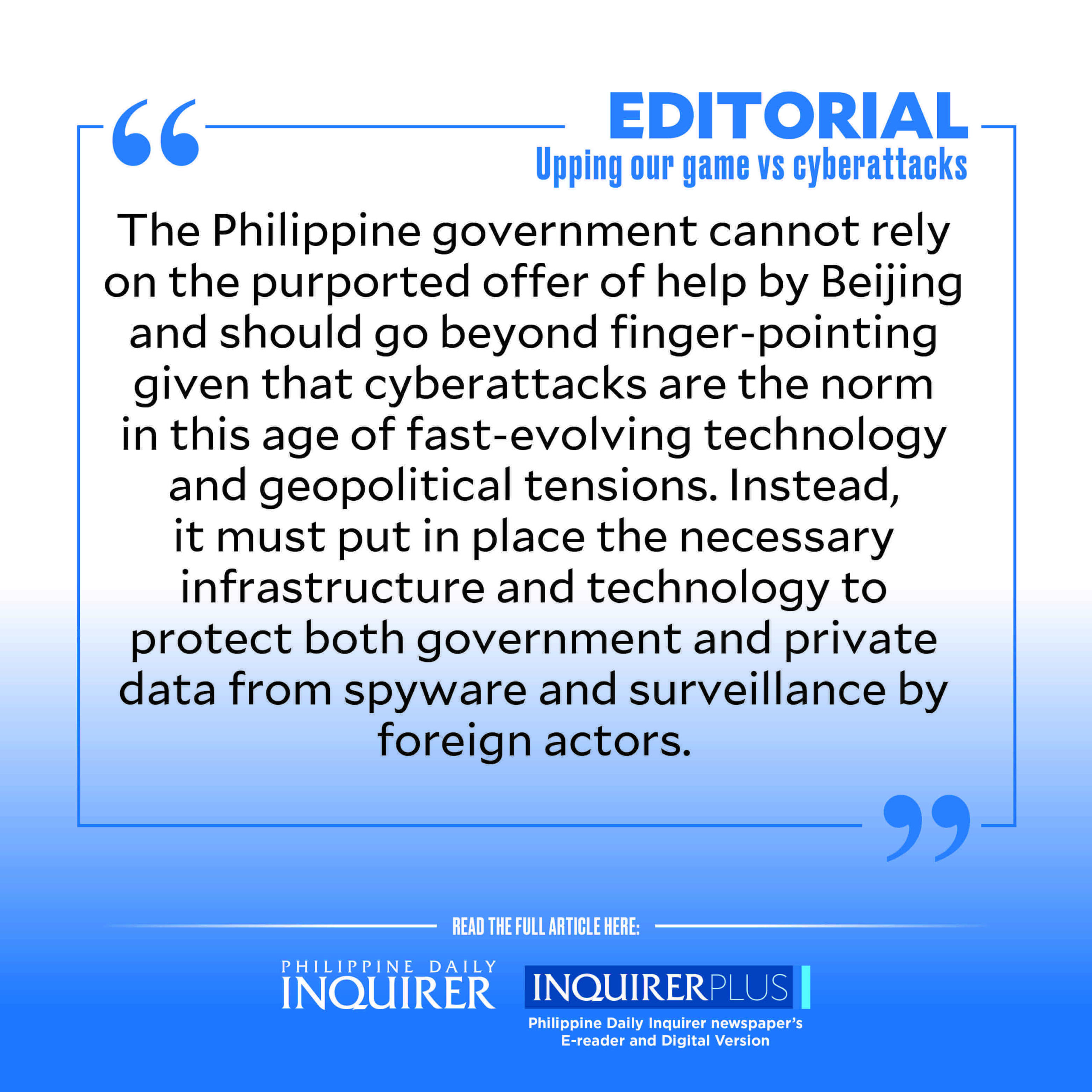
The Chinese embassy was understandably upset after the Department of Information and Communications Technology (DICT) reported the hacking attempts on several government agencies’ websites by “threat actors [who] were operating from within Chinese territory.”
Over the weekend, DICT Undersecretary Jeffrey Ian Dy said the agency had successfully blocked cyberattacks on the websites of the Overseas Workers Welfare Administration, the Philippine Coast Guard, the DICT itself, and the official website of President Marcos last month, which were carried out by hackers from a location in China. One of the attempts was from an internet protocol address traced to China Unicom, or the China United Network Communications Group Co., Ltd., a state-owned
telecommunications operator, Dy said.
The DICT official qualified that while “three advanced threat groups” were operating “within the ambit of Chinese territories,” these were “not necessarily [from the] government” of China. But he added that the threat groups were “associated with certain state-backed types of cybersecurity activities” targeting government emails and websites.
Another irritant
In response, the Chinese embassy in Manila issued a statement saying China “all along firmly opposes and cracks down on all forms of cyberattack” and that it “allows no country or individual to engage in cyberattack and other illegal activities on Chinese soil or using Chinese infrastructure.” The embassy also scored how some Philippine officials and the media “maliciously speculated about and groundlessly accused China” of being behind the attacks and connecting them to the dispute in the South China Sea.
While Dy said the attacks had been foiled, he said the Philippines will ask China’s help in tracking down the attackers. “I think we will need to coordinate with them so they can help us in this investigation,” he said. The belated disclosure of cyberattack incidents has added another irritant to the country’s testy relations with Beijing over the latter’s intrusions in the West Philippine Sea. But DICT Secretary Ivan John Uy said last Thursday that the Chinese government had offered to help track down the hackers.
Security threat
In March last year, the National Intelligence and Coordinating Agency signed a memorandum of understanding (MOU) with the National Grid Corp. of the Philippines (NGCP) to protect the country’s vital energy infrastructure against cyberattacks. The memo was signed following a Senate investigation on the NGCP—which is 40 percent owned by the State Grid Corp. of China—and the possibility that Beijing could sabotage the power grid in the wake of tensions over disputed territories in the West Philippine Sea.“
There have been fears that the involvement of any foreign entity in our power transmission system would present a security threat to the Philippines … This is a very good step towards answering that challenge,” President Marcos said during the signing of the MOU.
The cyberattacks on government websites last month show that the threat is real. The United States has openly accused China of infiltrating vital US infrastructure to disable them in the event of a conflict. This week, The Netherlands said state-backed cyberspies from China have gained access to a Dutch military network, which the Chinese embassy there denied through a similar statement issued in Manila.
The Philippine government cannot rely on the purported offer of help by Beijing and should go beyond finger-pointing given that cyberattacks are the norm in this age of fast-evolving technology and geopolitical tensions.
Political skirmishes
Instead, it must put in place the necessary infrastructure and technology to protect both government and private data from spyware and surveillance by foreign actors, who could potentially undermine national security and take advantage of ongoing domestic political squabbles to foment unrest and division.
The rise in online scams and identity theft perpetrated on social media underscores as well the urgent need to strengthen the government’s capability to ensure data privacy and the integrity of vital communication and technology infrastructure. A report by Kaspersky Security Network ranked the Philippines fourth in the world, and first in Southeast Asia, in terms of online threats. While the government has drawn up a cybersecurity plan to fend off cyberattacks, Uy pointed out the challenge of finding enough information technology personnel and cybersecurity experts.
The call of Speaker Martin Romualdez for government agencies to brief the House of Representatives on these recent cyberattacks and the “current measures in place to prevent future incidents” is thus a step in the right direction.
The divisive moves to amend the Constitution and political skirmishes related to upcoming elections should not distract the Marcos administration from upping its game to protect the country and its citizens from the dangers and enemies lurking in cyberspace.